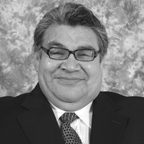
Billy Diamond, Cree, 1949-2010
“A bossy little kid.” That is how Ted Moses, the Cree chief who eventually achieved for the James Bay Cree a status at the United Nations similar to that of Amnesty International, described Billy Diamond. The combination of bossiness and stubbornness is probably the best way to explain how the son of a traditional trapper rose to become one of the great political leaders of Canada.
According to Billy, his father Malcolm Diamond told him: “Never, never agree with the government—no matter what.” And as Billy says: “I never have.” His belief that “great obstacles make great leaders” helped shape this Cree-speaking youngster into a leader who pitted himself against the Quebec government in a monumental fight for his people, and won.
Billy Diamond, a member of the Waskaganish First Nation in Quebec, was born in 1949. He was elected chief on July 7, 1970. Hudson’s Bay and James Bay, an area stretching across the northern reaches of Manitoba, Ontario and Quebec, form one of the world’s largest seas, fed by the waters of a third of all Canadian rivers. The Crees, most of whom live on the east coast of James and Hudson Bays, regard their traditional lands as a “garden” providing for all their needs. And it was Billy Diamond who, at 22 years of age, spearheaded a fight to save the lands on the Quebec side of James Bay, as well as Inuit territories, that were in danger of being flooded by the ‘project of the century,’ the gigantic James Bay Hydro-Electric Project.
By confronting Premier Robert Bourassa and the Quebec government, Diamond eventually achieved what is Canada’s first modern land-claim treaty, the James Bay Agreement. In 1981 he went to Geneva to present the case for Aboriginals to the United Nations. To accomplish this, he helped found the Grand Council of the Crees, the main Cree political organization in Northern Quebec and became the first grand chief.
It was as grand chief that Diamond had an audience with Pope John Paul II in November 1982. When the Pope asked how things were in Canada, Diamond replied: “We want you to speak on Aboriginal rights when you come.” And the Pope agreed, saying: “I do want to see how you live.” Five years later, on a visit to the United States, the pope stopped in Fort Simpson. He stated that Aboriginal people had “ … a right to a just and equitable measure of self-governing, along with a land base and adequate resources necessary for developing a viable economy.”
In 1975 the Crees signed agreements that would give them $136-million in compensation for traditional lands lost as a result of the hydro project. The Inuit portion was an additional $90-million. It is considered a coup, even though it took more than 30 years to be realized. The stalled negotiations led to an accord that will initiate Native self-government and eventually status as a Cree state within Canada, ratified by Parliament.
According to Matthew Mukash, grand chief of the Grand Council of the Crees: “This agreement sets us up in a nation-to-nation relationship.” Negotiated by Parti Québécois Premier of Québec, Bernard Landry, and by Cree Grand Chief Ted Moses, la Paix des Braves was signed in 2002, it is often held up as an example throughout the world of an agreement between an aboriginal nation and a Western society. After three decades of negotiations, the $1.4-billion settlement to launch the northern First Nation toward self-government was finally enacted on July 16, 2007. Billy Diamond, who negotiated the first agreement, said: “We’ve always dreamt of coming to this stage at some point, so this is a really historic day.”
Diamond also negotiated with Ottawa during constitutional talks on behalf of the Assembly of First Nations. He was instrumental in including an Aboriginal section in Canada’s second Constitution, the Canada Act 1982, known for the Charter of Rights and Freedoms.
Famous for his business acumen, former Grand Chief Billy Diamond helped found the Cree airline, Air Creebec. He also started the Cree Construction Company as well as CreeYamaha Motors to design boats suitable for northern use. Diamond was inducted into the Order of Quebec, and received a National Aboriginal Achievement Award in 1997 for his contribution to the world of Aboriginal business.
Chief Diamond passed away on September 30, 2010.
(Susan Hallett, Native Leaders of Canada, New Federation House, 2008)